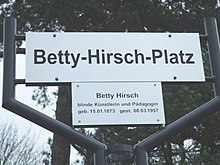Betty Hirsch
Betty Hirsch (born January 15, 1873 in Hamburg , † March 8, 1957 in Berlin ) was a Danish-German singer and blind and language teacher who went blind even after an accident.
Life
Hirsch was born in Hamburg as the eighth child of Danish-Jewish parents. She grew up bilingual because she spoke Danish at home and German at school . She lost her father when she was eight, fell from a chair when she was twelve and fell on her face. This started her blindness.
From April 1, 1893, Betty Hirsch was able to occupy a place in the women's home of the institution for the blind in Steglitz . Here she learned braille and continued her cultural and technical training. Among other things, she took singing lessons. In addition, she gave private lessons in German and singing for the blind and sighted. As a concert singer, she was able to celebrate successes with her pianist .
After a health breakdown in 1907, she decided to go to England to teach German and Danish and also to study the English language. She began this journey in 1908. She was supported by a scholarship .
After her return to Berlin in August 1909, she had enough language students to teach her to earn a living. In order to be able to offer her services officially, she passed a language teacher examination in Hamburg.
In 1914 Betty Hirsch heard of " war blind ", people who had been blinded by armed events during the First World War . She wanted to help these people and found in Privy Councilor Paul Silex an ophthalmologist who enjoyed a great reputation and who convinced her to provide the war blind with further help in addition to medical help. Beginning in November 1914, Betty Hirsch began teaching on a voluntary basis and taught the blind to use Braille, normal typewriting and other manual skills. For a living, she continued to take private lessons. Silex supported them through fundraising and with his personal fortune.
Betty Hirsch looked for and found work opportunities for blind people in state-run companies to enable them to integrate among the sighted. With the increasing number of war blind people from 1916 onwards, Silex asked private companies to look after the blind with work tasks. With their experiences in England, Hirsch and Silex trained blind officers, civil servants, teachers, students and merchants to become office workers.
Beginning in 1918, Betty Hirsch became a permanent employee of the college for the blind, which over time gained a great reputation. By the end of the war the school had trained 250 war blind people. Since the number of blind people continued to rise after the end of the war, the school continued to receive support from the authorities. From 1920 the school also accepted civilian blind people.
After Privy Councilor Silex resigned from his job in the spring of 1923 at the age of 65, Betty Hirsch continued to run the school and she managed to continue to raise sufficient donations to cover material costs. For personnel costs came largely magistrate in the city of Berlin.
Hirsch organized that from 1926 the former pupil Karlheinz Tschepke taught the next pupils in commercial shorthand . Hirsch traveled to the USA and England to exchange experiences and continued her life's work.
After the National Socialists came to power on January 30, 1933, Hirsch kept the school going as long as she could. In October 1933 she then left Berlin for Hamburg and emigrated from there to England, after having appointed her former private secretary Thiermann as her successor. The school was taken over by the city of Berlin as the "Silex trading school for the blind".
After the end of the Second World War , Betty Hirsch was commissioned to reunite the school branches, which had meanwhile been distributed throughout Germany, in Berlin. On April 1, 1949, the flint trading school moved into the building of the Steglitz educational institution for the blind and was subordinated to it administratively. With that, Betty Hirsch had not achieved her real goal of revitalizing "her" school.
On the occasion of her 80th birthday in 1953, Betty Hirsch received honorary membership of the Association of the War Blind and, in 1956, honorary membership of the German Association of the Blind .
On March 8, 1957, Betty Hirsch died of old age in Berlin at the age of 84. Her urn was buried on March 20th. After the rest period in the cemetery had expired in 1977, the urn site was reassigned as nobody had thought of renovating their grave or having it set up as an honorary grave .
Honors
On May 8, 1961, at Handjerystraße 23 in Berlin-Friedenau, the Betty Hirsch House for the Blind, named after her, was opened . According to a resolution of the district assembly of Charlottenburg-Wilmersdorf, the former Platz S in Berlin-Schmargendorf at the corner of Rheinbabenallee and Hundekehlestrasse was renamed Betty-Hirsch-Platz in a public ceremony on March 8, 2008 . The library of the Berlin Institute for the Blind and a special needs school in Stuttgart were named after her.
Web links
- Literature by and about Betty Hirsch in the catalog of the German National Library
- Article of the German Association of the Blind and Visually Impaired in Study and Work about Betty Hirsch
- Johann-August-Zeune-School for the blind
- Betty Hirsch School Stuttgart
| personal data | |
|---|---|
| SURNAME | Hirsch, Betty |
| BRIEF DESCRIPTION | Danish-German singer and teacher for the blind and language |
| DATE OF BIRTH | January 15, 1873 |
| PLACE OF BIRTH | Hamburg |
| DATE OF DEATH | March 8, 1957 |
| Place of death | Berlin |

